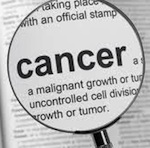Several weeks ago, a very good client of mine sent me this study, which I have summarized and provided a link for below!
I know that the topic of cancer is a bit morbid but the statistical significance of this condition directly or indirectly affecting everyone on the planet is very high. Having worked with hundreds of people that have either had cancer, are undergoing treatment or interested in prevention, I believe this research is very important for everyone to be aware of.
Cancer is a condition of the 21st century for a multitude of reasons, including toxicity, dietary factors, infections, genetics, but also stress. Stress may be emotionally triggered, as most people believe, but stress can also come from the other factors that I mentioned. Regardless of the source of stress, the objective of cancer treatment must be to support an individualized program, that takes into account all of these factors.
Theories and research connecting the emotionally associated causes of cancer have been around for a long time, and practices directly targeting the impact of traumatic life events are available. My objective in writing this article is not to provide details about these treatments but to make people aware of these specific personality traits and consider the negative impact they have on our health.
The basic premise here is being able to express yourself, make changes in your life, if you are suffering from depression, be assertive, form strong social or family networks and don’t mentally down play health concerns.
Often the topic of childhood cancer is used to counter this argument, however as many of you are aware, childhood trauma is far too common. Traumatic events can affect us at any age so we need to work at coping with stressful events in a positive manner and support our loved ones, when emotional or physical trauma occurs.
The Cancer Prone Personality
Cancer Prone Personality Study – Katz, L. S., & Epstein, S. (2005). The relation of cancer-prone personality to exceptional recovery from cancer: A preliminary study. Advances, 21, 1-15.
One source of psychological factors that has been proposed as possibly influencing the onset and course of cancer is a constellation of cancer-prone personality attributes. Following is a list of the attributes that have been suggested from various sources.
(e.g., Antoni & Goodkin, 1988; Dunkel-Schetter, 1984; Eysenk, 1988; Greer & Watson, 1985; Gil, 1989; Jansen & Muenz, 1984; Kune, et al.1991; LeShann, 1977; Levy, 1985; Temoshok, 1987; Temoshok & Dreher, 1992; Temoshok & Heller, 1984):
- unable or unwilling to express emotions, particularly hostility
- feeling hopeless, helpless, and deeply despairing, or lacking interest in or commitment to important issues in one’s life
- being unassertive and unable to express or fulfill one’s own needs, yet eager to please others and fulfill their needs
- feeling socially isolated, unwanted and/or unloved
- maintaining a stoic facade of well-being
In marked contrast to the characteristics attributed to the cancer-prone personality are the following characteristics attributed to cancer patients with unexpectedly favorable outcomes:
- openly expressing anger and hostility when confronted with frustrating situations
- having a high degree of determination and a “fighting spirit”
- having a positive outlook, particularly with regard to one’s treatment
- assuming an active role in one’s treatment
- taking charge of one’s life and being “true to oneself” and assertive in fulfilling one’s needs
- having a deep and satisfying relationship with one or more people
(Cunningham, 1992; Cunningham & Watson, 2004; Derogatis, Abeloff, & Melisaratos, 1979; A. Epstein, 1989; Greer, Morris, & Pettingale, 1979; Rogentine et al., 1979; Roud, 1990; Temoshok, 1987; Temoshok & Dreher, 1992; Williams, 1990).
For the complete study please click here
